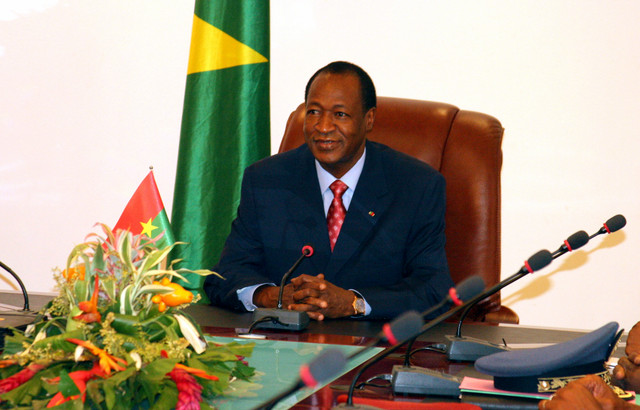
Ouagadougou, (Burkina Faso) - Blaise Compaore, Burkina Faso's President and a mediator for the Economic Community of West African States (ECOWAS), chaired the talks in his country’s Ouagadougou on Saturday with other regional leaders. The meeting called on Mali to request a UN-backed intervention to try to win back the country's north, which has been taken over by forces loyal to Al Qaeda. ECOWAS has also called for a unity government by July 31.
The ECOWAS meeting Saturday with the presence of the Presidents of six West African nations including Burkina, Ivory Coast, Nigeria, Niger, Togo and Benin was aimed at attempting to find a solution to the growing crisis in Mali.
They also are calling on Mali to create a government of national unity by July 31, the next step in bringing the nation back to constitutional rule following the 22 March military coup that partly provoked the chaos allowing the Islamist rebel faction to seize the north.
Mali's civil leaders are set to meet West African leaders in Burkina Faso amid moves to create a government of national unity to tackle a crisis in the country's north, where Islamist fighters have enforced sharia law.
Mali’s Interim president Dioncounda Traore, who has been receiving medical care in Paris since being attacked in his office in May, is among the notable abstentees at the talks.
Renegade soldiers overthrew the elected president on March 22 but, under intense regional and international pressure, later agreed to hand power back to a civilian administration.
There was no reason given for the absence Cheikh Modibo Diarra, the prime minister, though his relations with ECOWAS have been strained as the regional grouping looks for a more "inclusive" government in Mali.
The Popular Movement of 22 March (MP 22), which supports the coup of March 22, also boycotted the meeting in Ouagadougou.
Mali has continued its descent into chaos since then and is effectively split in two, with Islamist groups linked to al-Qaeda controlling the north, a territory as big as France.
For ECOWAS, the urgent priority is to reinforce and stabilise Mali's transitional authorities in order to handle the crisis in the north.
The option of a military intervention by a regional force in order to restore the country's territorial integrity is also on the table, though such a move would require the UN's blessing.
New video footage emerged on Friday which appeared to show a group of men destroying a tomb in the ancient Malian city of Timbuktu earlier in the week.
The video, filmed on Sunday, showed the group using pickaxes to destroy what is believed to be a tomb at the centuries-old mausoleum of Alpha Moya.
The UN Security Council on Thursday passed a resolution calling for sanctions against al-Qaeda-linked fighters blamed for the desecration of the tombs of Muslim saints.
The council expressed "deep concern" at the increased terrorist threat in the north due to the presence of al-Qaeda in the Islamic Maghreb (AQIM) fighters. The group has been blamed for kidnappings and attacks in several west and north African countries.
But the council held back from giving a UN mandate to any West African force to help the interim government to take back territory from the Islamist rebels in the north.
The International Criminal Court has described the destruction of Timbuktu's heritage as a possible war crime, while UNESCO's committee on world heritage was due to hold a special session this week to address the pillaging of the site, one of the few in sub-Saharan Africa that is listed by the agency.
The Islamic faction, known as Ansar Dine, or "defenders of the Faith", seized control of Timbuktu last week after ousting the Tuareg rebel faction that had invaded northern Mali alongside Ansar Dine's soldiers three months ago.
Over last weekend, fighters screaming "Allahu Akbar" descended on the cemeteries holding the remains of Timbuktu's Sufi saints, and systematically began destroying the six most famous tombs.
They believe the tombs are not consistent with Islamic law.
Reached by telephone in an undisclosed location in northern Mali, a spokesman for the faction said they do not recognise either the United Nations or the world court.
'Possible war crime'
Among the tombs they destroyed is that of Sidi Mahmoudou, a saint who died in 955, according to the UNESCO website. In addition, on Monday they set upon one of the doors of the Sidi Yahya, a mosque built around 1400.
Local legend held that the gate leading to the cemetery would only open on the final day at the end of time.
The UN cultural agency has called for an immediate halt to the destruction of the sacred tombs. Irina Bokova, who heads UNESCO, reported in a statement issued on Saturday that the centuries-old mausoleums of Sidi Mahmoud, Sidi Moctar and Alpha Moya had been destroyed.
Meeting in St Petersburg in Russia, UNESCO's World Heritage Committee, last week had placed the mausoleums on its list of sites in danger due to earlier attacks by the Islamists, said UNESCO spokesman Rony Amelan.
On Sunday during a stop in Senegal, Fatou Bensouda, prosecutor for the International Criminal Court, said that the destruction of the city's patrimony constitutes "a possible war crime".


